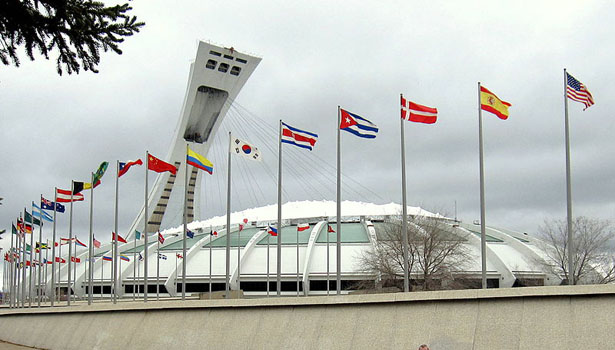The Olympics Used To be So Politicized That Most of Africa Boycotted in 1976
When New Zealand's rugby team broke the international sports embargo on Apartheid South Africa, 28 African countries retaliated by sitting out the following summer's Olympic games.

Today, the Olympics are idealized as a sacrosanct, apolitical space, an opportunity for the nations of the world to come together free of their political or historical baggage. Even the tensest moments at the ongoing London games, such as the Lebanese judo team's sneering treatment of their Israeli counterparts, do little to disrupt the overall spirit. It's the conflict-transcending moments that demonstrate what the games are really capable of, such as when Georgia's Nino Salukvadze and Russia's Natalia Paderina embraced on the medal stand in 2008, even as their countries were at war. As The Atlantic's Ashley Fetters explained last week, when enemies face off at the Olympics -- even South and North Korea -- it's usually an intense but still fundamentally athletic affair. The Olympics, the thinking goes, offer a uniquely peaceful and mutually respectful meeting-place for the nations of the world, an inspiring demonstration of how a mere table tennis match can make even intractable, decades-long international crises seem petty or small. But it hasn't always been that way, and the Olympics were once a particularly bright flashpoint in one of the Cold War era's tensest geopolitical dramas.
In 1976, 28 African countries announced just days before the opening ceremony that they would boycott the summer games in Montreal. The boycotters said they refused to participate alongside New Zealand, whose national rugby team had embarked on a controversial tour of apartheid South Africa that summer, in defiance of an informal but widely observed international athletics embargo on the country.
That June, South Africa's government massacred over 350 anti-apartheid protestors during the infamous Soweto riots. The boycott's message was clear: it wasn't enough to just exclude South Africa from the Olympics (the country was barred from playing starting in 1964, and outright expelled from the International Olympic Committee in 1970). The boycotters considered it unacceptable for any country or any international sporting organization to legitimize the South African government in any way, as New Zealand's rugby team had done, and, they believed, as the IOC was doing by refusing to exclude New Zealand from the games.
The boycott had a major impact on the 1976 Olympics, which are best remembered for the U.S.'s near-sweep in boxing and Romanian Nadia Comenici's perfect 10s in gymnastics. One million Canadian dollars in seat and hotel reservations had to be refunded, according to the BBC, during the first two days of the games alone, as a result of the boycott. A number of events were marred as well; the track meet was badly diminished by the absence of perennial powerhouses like Tanzania and Kenya.
The boycott's legacy expanded beyond the games, as sports historian Courtney Mason explained in an essay in Onward to the Olympics: Historical Perspectives on the Olympic Games. "The 1976 boycott not only generated international consciousness for the anti-apartheid movement, but also indirectly induced social and political change," she wrote.
The threat of an African boycott had already kept South Africa out of the 1968 and 1972 Olympics. As she notes, the African states' threat to skip Montreal failed to bar New Zealand from the games or to compel the country to cancel the All Blacks' tour of South Africa. But despite "being regarded as a costly tactical misjudgment," Mason identified two ways in which it was still a signal moment in the larger and eventually-successful effort to bring down South Africa's apartheid government:
First ... the boycott generated considerable international interest in the South African apartheid policy, and contributed to the evolving campaigns of opposition to it. Second, the African-led boycott may have had a more direct implication on the anti-apartheid campaign in South Africa. The united stand of black Africa was seen throughout the world. The perception of black Africa's willingness to sacrifice for the anti-apartheid cause in South Africa significantly raised the morale of the black youth protestors.
And it might have had an impact within New Zealand as well, setting the stage forfor one of the next decade's most emblematic collisions of politics and sports. The South African rugby team's 1981 tour of New Zealand was met with widespread protests and civil disobedience from New Zealanders. Stadium-occupying anti-apartheid activists even succeeded in canceling a scheduled test-match. New Zealand joined the world's athletic boycott of South Africa shortly afterwards -- a global effort that Desmond Tutu called "the sanction that hurt the supporters of apartheid the most."
Despite a brief threat from Iran to boycott over the Olympic logo's alleged resemblance to the word "Zion" (seriously), this year's Olympics have been boycott-free. Even the North Korean team decided to stick around after its women's soccer team weathered the ultimate insult when a scoreboard mistakenly posted the South Korean flag next to a player's name, and the Israeli team marched in the opening ceremonies despite the International Olympic Committee's refusal to commemorate the 1976 Munich Olympic massacre. Athletes from countries that don't recognize Israel have figured out how to avoid competing against Israeli teams, but no state has decided to skip the Olympics outright. This is hardly an era of universal interstate peace, but the 2012 Olympics could nevertheless go down as the most inclusive in history. The 1976 boycott was a problematic but perhaps inevitably productive intersection of politics and sports. In a way, the current festivities in London are political precisely by avoiding politics, showing that the world can hold an event where nations put their differences aside, even just for a couple of weeks.